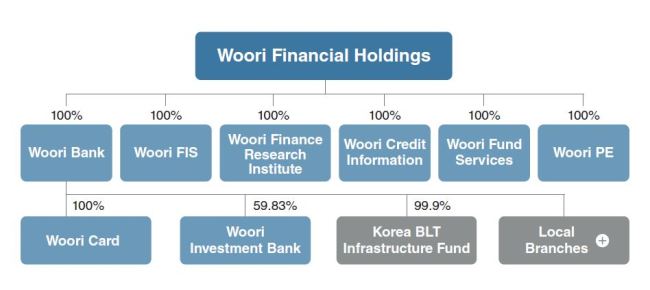Facing the most drastic business evolution among South Korea’s major banking groups this year is Woori Financial Group, which has recently resumed its financial holding company structure after years of privatization struggles.
As the transformation has come amid the fast rise of financial technology, the downturn of conventional banking business and a generally slowing economy, the novice financial group set its mind this year on buttressing information and communication technology, risk management and nonbanking businesses during the restructuring process.
Woori started as the country’s first-ever banking group in 2001, consisting of multiple banks that went under in the wake of the 1997 Asian financial crisis.
In the following years, the government attempted over several occasions to privatize the group by selling off its nonbanking units. During the process, Woori Financial Holdings was absorbed by Woori Bank in 2014, a move that eliminated the holding company structure.
It then took years for the bank to resume its former business structure, which acted as a handicap for it against other lenders that enjoyed the synergy of their group affiliates.
In November, the Financial Service Commission finally approved the bank’s plan for a holding company as the government sold off its stake in the bank.
 |
Woori Financial Group Chairman and Woori Bank CEO Sohn Tae-seung (sixth from left) attends the group’s inauguration ceremony held in January. (Woori Financial) |
“As a financial holding group, we may now compete with other financial groups on equal terms,” said President Sohn Tae-seung, who also serves as president of Woori Bank, at the group’s inauguration ceremony in January, which also celebrated 120 years in business for the bank.
The group allocated some 90 employees from various affiliates to constitute Woori Financial Holding, the holding unit of the group. Most of the corresponding workers had previously belonged to the task force, set up in November to prepare for the business structure changeover.
The holding company currently has three headquarters, for management and planning, administration and risk management.
Leading the management and planning headquarters, which is to serve as the control tower not only for the holding company but for the entire banking group, is Vice President Park Kyung-hoon, formerly involved in key mergers and sell-offs of the former holding group.
The administration headquarters is to take charge of personnel affairs, social contributions and digital strategies under the lead of Vice President Choi Dong-soo. Assuming a core role in this sector is the ICT planning department, which is to design the group’s mid- and long-term ICT strategies and infrastructure.
The risk management headquarters, newly founded, will work with the bank’s risk management teams to build a new credit risk evaluation model and related regulations.
“As the holding company is now equipped with management planning and administrative functions, it is now fully ready to act as a business joint to connect the chairman, affiliates and the entire group,” said an official.

Aligned within the group under Woori Financial Holdings are six major affiliates -- signature banking unit Woori Bank, IT firm Woori FIS, Woori Finance Research Institute, Woori Credit Information, Woori Fund Services and Woori Private Equity. Also, the bank consists of smaller affiliates such as Woori Card and Woori Investment Bank.
Seeking to create synergy among the diverse affiliates and to move in line with the global digitalization trend, the group recently named Noh Jin-ho, former chief executive of Hancom, as the new chief information officer and head of the ICT planning team.
The appointment also reflects Chairman Sohn’s policy of outsourcing outside experts, especially in key growth business sectors, officials added.
Last year, Woori Bank achieved 2.02 trillion won ($1.79 billion) in net profits, up 33.5 percent from a year prior. This marked a return on investment of 9.6 percent, as well as the largest volume of year in net profit for the lender.
It was also noted for tangible growth in its global business, in which it realized a net profit of 200 billion won, up 19.7 percent on-year.
“(The bank’s performances) were largely backed by its extensive overseas network, comprising 441 offices worldwide, which by far outruns the corresponding figures of rival groups,” said an official.
In June last year, Woori Bank acquired Vision Fund Cambodia, a retail-specialized local financial company with total assets of 220 billion won, and changed its name to WB Finance.
Also in October, the bank obtained approval from Germany’s financial regulator and the European Central Bank to establish a European branch in Frankfurt.
This year, the top priority task for the banking group is to boost its overall size and market leverage through aggressive mergers and acquisitions in the nonbanking sector, according to officials.
“This year, we shall focus on acquiring asset management and real estate fund businesses, which offer maximum synergy on minimum capital,” said an official.
Coming up next will be capital companies, savings banks and brokerages, while insurers will be put off for mid- or long-term consideration, the official added.
By Bae Hyun-jung (
tellme@heraldcorp.com)








![[Today’s K-pop] Blackpink’s Jennie, Lisa invited to Coachella as solo acts](http://res.heraldm.com/phpwas/restmb_idxmake.php?idx=644&simg=/content/image/2024/11/21/20241121050099_0.jpg)
